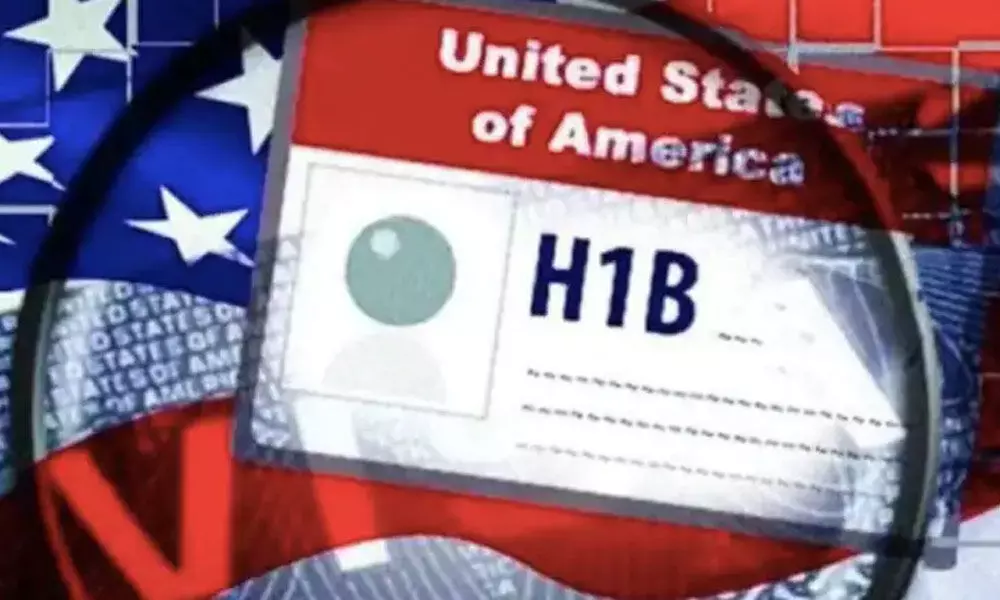Live
- They always want me to win, and now I feel lucky to have been offered a story like ‘Zebra’: Satyadev Kancharana
- ‘Democracy first, humanity first’: PM Modi in Guyana's parliament on two countries' similarities
- PKL Season 11: Telugu Titans register third straight win to top standings
- Is Pollution Contributing to Your COPD?
- NASA Unveils Underwater Robots for Exploring Jupiter's Moons
- Additional Central forces arrive in violence-hit Manipur
- AR Rahman and Saira Banu’s Divorce: Legal Insights into Common Issues in Bollywood Marriages
- 82.7 pc work completed in HPCL Rajasthan Refinery area: official
- Curfew relaxation extended in 5 Manipur districts on Friday
- Tab scam prompts Bengal govt to adopt caution over fund disbursement
Just In
Indian talent moving to Canada from US: Experts tell American lawmakers


Indian talent moving to Canada from US: Experts tell American lawmakers
The much sought after Indian talent is moving to Canada from the US due to the country's outdated immigration policies, particularly on H-1B visas, experts have told American lawmakers
Washington: The much sought after Indian talent is moving to Canada from the US due to the country's outdated immigration policies, particularly on H-1B visas, experts have told American lawmakers. This is mainly because of the per-country quota on issuing the employment-based Green Card or permanent residency, the experts said on Tuesday, urging the US Congress to act fast to prevent the Indian talent from moving to Canada from the United States.
Without Congressional action, the total backlog for all three employment-based categories for Indians would increase from an estimated 9,15,497 individuals currently to an estimated 21,95,795 individuals by fiscal 2030, executive director of National Foundation for American Policy Stuart Anderson said.
"We should let that number sink in: Within a decade, more than 2 million people will be waiting in line for years or even decades for employment-based green cards," he submitted in his testimony before the House Judiciary Committee-Subcommittee on Immigration and Citizenship.
Testifying before the panel on "Oh, Canada! How Outdated US Immigration Policies Push Top Talent to Other Countries," Anderson said that highly skilled foreign nationals, including international students, are choosing Canada over America. "This has happened in response to how difficult it is to work in the United States in H-1B status or gain permanent residence, and the comparative ease of international students and foreign nationals working in temporary status and then acquiring permanent residence in Canada," he said.
The H-1B visa is a non-immigrant visa that allows US companies to employ foreign workers in speciality occupations that require theoretical or technical expertise. Technology companies depend on it to hire tens of thousands of employees each year from countries like India and China.
The number of international students from India enrolled in graduate-level computer science and engineering at US universities declined by more than 25 per cent between 2016-17 and 2018-19 academic years, according to an analysis of US government data by the National Foundation for American Policy (NFAP).
To place the significance of the decline in context, international students represent approximately 75 per cent of the full-time graduate students at US universities in computer science, and in the 2016-17 academic year, two-thirds of the international students at the graduate level in computer science at US universities were from India. At the same time, fewer Indian students were coming to America, the number of Indian students attending Canadian universities rose from 76,075 in 2016 to 1,72,625 in 2018, an increase of 127 per cent, according to the Canadian Bureau for International Education, he said.
"In sum, Canada's immigration policies are much better than America's for facilitating the entry of talented individuals. Congress established America's policies in 1990, before smartphones, e-commerce, social media, cloud computing and the daily use of the internet exploded the demand for high-skilled technical labour. "The world has changed since 1990, the US immigration policy has not," Anderson said.
The Canadian government has made it increasingly easy for employers to attract and retain talent. On the other hand, numerical restrictions on high-skilled temporary visas block the vast majority of foreign-born applicants from working in America in a given year, Anderson said.
In March 2021, employers filed 3,08,613 H-1B registrations for cap selection for FY 2022 for only 85,000 H-1B petitions. "That means over 72 per cent of H-1B registrations for high-skilled foreign nationals were rejected even before an adjudicator evaluated the application," he said. Jennifer Young, the CEO of Technology Councils of North America, said that fast-growing Canadian companies are permitted to hire highly-skilled foreign talent, or people with skillsets most commonly found among H-1B applicants in the United States, in as little as four weeks, pre-pandemic.

© 2024 Hyderabad Media House Limited/The Hans India. All rights reserved. Powered by hocalwire.com






